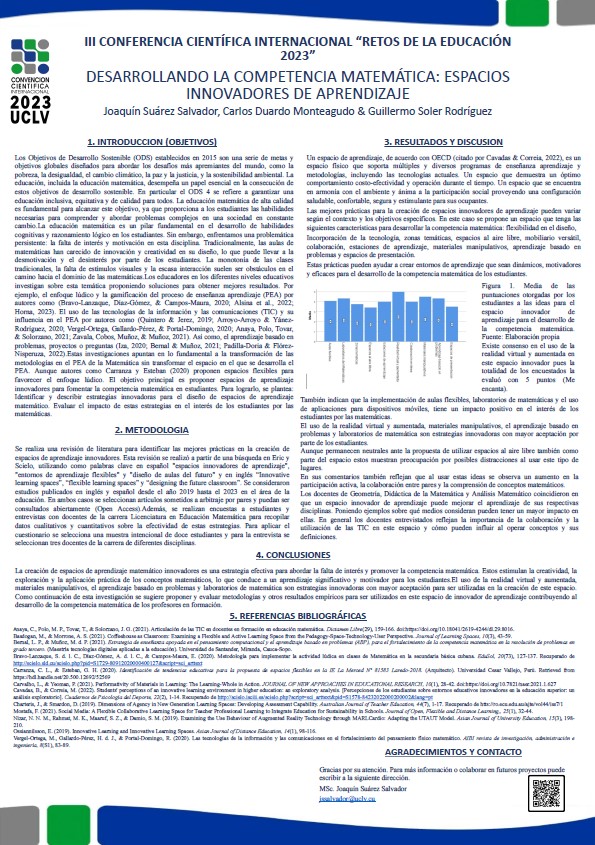Executive Secretary

III Conferencia Científica Internacional "Retos de la Educación 2023"
V TALLER CIENTÍFICO METODOLÓGICO INTERNACIONAL. “LA FORMACIÓN DOCTORAL EN CIENCIAS DE LA EDUCACIÓN. RETOS Y PERSPECTIVAS”

Resumen
Problemática: Este estudio aborda la necesidad de promover el desarrollo efectivo y atractivo de la competencia matemática en estudiantes. Tradicionalmente, las aulas de matemáticas carecen de innovación y creatividad, lo que puede desmotivar y disminuir el interés en esta materia.
Objetivo(s): El objetivo principal es proponer espacios de aprendizaje innovadores para fomentar la competencia matemática en estudiantes. Para lograrlo, se plantea: Identificar y describir estrategias innovadoras para el diseño de espacios de aprendizaje matemático. Evaluar el impacto de estas estrategias en el interés de los estudiantes por las matemáticas.
Metodología: Se realiza una revisión de literatura para identificar las mejores prácticas en la creación de espacios de aprendizaje innovadores. Además, se realizan encuestas y entrevistas con docentes y estudiantes para recopilar datos cualitativos y cuantitativos sobre la efectividad de estas estrategias.
Resultados y discusión: Los resultados indican que la implementación de espacios de aprendizaje innovadores, como aulas flexibles, laboratorios de matemáticas y el uso de aplicaciones para dispositivos móviles, tuvo un impacto positivo en el interés de los estudiantes por las matemáticas. Se observa un aumento en la participación activa, la colaboración entre pares y la comprensión de conceptos matemáticos.
Conclusiones: La creación de espacios de aprendizaje matemático innovadores es una estrategia efectiva para abordar la falta de interés y promover la competencia matemática. Estos estimulan la creatividad, la exploración y la aplicación práctica de los conceptos matemáticos, lo que conduce a un aprendizaje significativo y motivador para los estudiantes.
Abstract
Problem Statement: This study addresses the need to effectively and attractively promote the development of mathematical competence in students. Traditionally, mathematics classrooms lack innovation and creativity, which can demotivate and reduce interest in this subject.
Objective(s): The main objective is to propose innovative learning spaces to foster mathematical competence in students. To achieve this, the following objectives are set: Identify and describe innovative strategies for the design of mathematical learning spaces. Evaluate the impact of these strategies on students' interest in mathematics.
Methodology: A literature review is conducted to identify best practices in creating innovative mathematical learning spaces. Additionally, surveys and interviews with educators and students are conducted to gather qualitative and quantitative data on the effectiveness of these strategies.
Results and Discussion: The results indicate that the implementation of innovative learning spaces, such as flexible classrooms, mathematics laboratories, and the use of mobile applications, had a positive impact on students' interest in mathematics. There is an observed increase in active participation, peer collaboration, and understanding of mathematical concepts.
Conclusions: The creation of innovative mathematical learning spaces is an effective strategy to address the lack of interest and to promote mathematical competence. These spaces stimulate creativity, exploration, and practical application of mathematical concepts, leading to meaningful and motivating learning for students. Mathematical education can benefit from the implementation of these innovations in the design of learning spaces.
Sobre el ponente

M. Sc. Joaquín Suárez Salvador

Discussion
